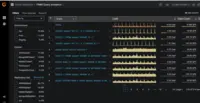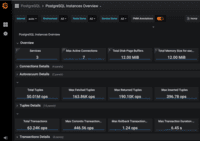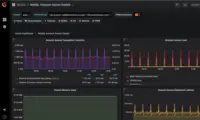Overview
What is Percona Monitoring and Management (PMM)?
Percona Monitoring and Management (PMM) is a highly sophisticated open-source solution that helps businesses manage their database environments effectively. It simplifies the overall management process, reduces complexity and optimizes performance by quickly identifying issues that may impact business...
Pricing
Entry-level set up fee?
- No setup fee
Offerings
- Free Trial
- Free/Freemium Version
- Premium Consulting/Integration Services
Would you like us to let the vendor know that you want pricing?
11 people also want pricing
Alternatives Pricing
Product Demos
Installing Percona Monitoring & Management PMM on Ubuntu 20.04 LTS - Database Monitoring Tutorial
Percona Monitoring and Management PMM Demo 35 - Platform Teams - 2022-05-31
#PMM Overview | about Percona Monitoring and Management
Percona Monitoring and Management Demo
Percona Monitoring and Management Demonstration
Product Details
- About
- Integrations
- Tech Details
- Downloadables
What is Percona Monitoring and Management (PMM)?
Percona Monitoring and Management (PMM) is a highly sophisticated open-source solution that helps businesses manage their database environments effectively. It simplifies the overall management process, reduces complexity and optimizes performance by quickly identifying issues that may impact business operations. PMM has innovative tools which improve data security, reduce the risk of exposure and prevent potential outages in your database systems.
This software's primary objective is to provide users with a single platform to efficiently monitor databases' health status, including troubleshooting bottlenecks and scaling issues without vendor lock-in or exorbitant fees. It seamlessly integrates both on-premises and cloud-based databases into one centralized location for easy access. Thousands of companies worldwide trust PMM to ensure that their complex database environments are functioning smoothly while maintaining high levels of security standards. Percona's team provides customers with enterprise-class software, support, consulting services along with training options from seasoned professionals who operate globally in more than 35 countries worldwide.
Percona Monitoring and Management (PMM) Features
- Supported: Alerts and notifications
- Supported: Dashboard
- Supported: Query Analysis
- Supported: Anomaly Detection
- Supported: Troubleshooting
- Supported: Resource Optimization
- Supported: Performance Monitoring
- Supported: Historical Trend Analysis
- Supported: Dependency Tracking
- Supported: Access Controls/Permissions
- Supported: Prioritization
Percona Monitoring and Management (PMM) Screenshots
Percona Monitoring and Management (PMM) Video
Percona Monitoring and Management (PMM) Integrations
Percona Monitoring and Management (PMM) Technical Details
| Deployment Types | On-premise |
|---|---|
| Operating Systems | Windows, Linux, Mac |
| Mobile Application | No |









